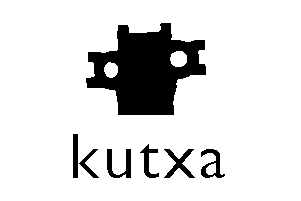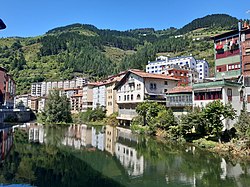
Euskadiko Ezkerra was a Basque socialist political organisation. It was founded as a coalition of Euskal Iraultzarako Alderdia and other Basque Marxist forces in 1977 to present lists for the Spanish general elections in the constituencies of Biscay, Gipuzkoa and Álava, while Navarrese Left Union (UNAI), an allied coalition, was to present a list in the constituency of Navarre.

Fruiz also known as Fruniz is a town and municipality located in the province of Biscay, in the autonomous community of Basque Country, northern Spain.

Mundaka is a town and municipality located in the province of [Bizkaia]], in the autonomous community of Basque Country, in northern Spain. Mundaka is internationally renowned for the surfing community that takes advantage of its coast and unique oceanic conditions.

Santurtzi is a port town in the province of Biscay, in the autonomous community of Basque Country, Spain. It is located in the Bilbao Abra bay, near the mouth of the Nervión river, on its left bank, 14 kilometres (8.7 mi) downriver from Bilbao and forms part of the Greater Bilbao agglomeration. It has a population of 45,853 (2019) and a land area of 6.77 square kilometres (2.61 sq mi).

Laudio in Basque or Llodio in Spanish is a town and municipality located in the province of Álava, in the Basque Country, northern Spain.

The Kutxa is a savings bank mainly operating within a regional scope in the Gipuzkoa province of Spain. Its Spanish name is Caja de Ahorros y Monte de Piedad de Gipuzkoa y San Sebastián but it was re-branded as Kutxa. On 1 January 2012 it merged with other Basque financial entities, Bilbao Bizkaia Kutxa (BBK) and Caja Vital Kutxa, to form Kutxabank.

The 2012 Basque regional election was held on Sunday, 21 October 2012, to elect the 10th Parliament of the Basque Autonomous Community. All 75 seats in the Parliament were up for election. The election was held simultaneously with a regional election in Galicia. Lehendakari Patxi López announced the parliament's dissolution half a year ahead of schedule as a result of the People's Party (PP) withdrawing their support from his government, prompting Galician president Alberto Núñez Feijóo, who had been scheduling a snap election in Galicia to be held at some point throughout late 2012, to make his decision to have a simultaneous vote.
EH Bildu, short for Euskal Herria Bildu, is a left-wing, Basque nationalist and pro-independence political party and a federation of political parties in Spain. It is the main political force of the abertzale left in Spain. EH Bildu is active in the Southern Basque Country, that is, in the Basque Autonomous Community and Chartered Community of Navarre, as well as in the Treviño enclave of the Burgos Province. In the Northern Basque Country, it has an alliance with the party Euskal Herria Bai, with the goal of establishing a state for the Basque Country across the Spanish-French border.

The 2016 Basque regional election was held on Sunday, 25 September 2016, to elect the 11th Parliament of the Basque Autonomous Community. All 75 seats in the Parliament were up for election. The election was held simultaneously with a regional election in Galicia. Lehendakari Iñigo Urkullu announced that the election would be held one month ahead of schedule, on 25 September 2016, based on the "climate of ungovernability" affecting national politics as a result of the ongoing Spanish government formation negotiations, intending to move the regional election as far away as possible from a possible new general election. This prompted Galician president Alberto Núñez Feijóo to hold the Galician regional election in the same date.

Eusko Alkartasuna is a Basque nationalist and social-democratic political party operating in Spain and France. The Basque language name means Basque Solidarity and abbreviated as EA. The party describes itself as a "Basque nationalist, democratic, popular, progressive and non-denominational party". The party has adopted the slogan "Euskal Sozialdemokrazia".

The 2020 Basque regional election was held on Sunday, 12 July 2020, to elect the 12th Parliament of the Basque Autonomous Community. All 75 seats in the Parliament were up for election. The election was initially scheduled for 5 April 2020 but was postponed as a result of the COVID-19 pandemic. It was held simultaneously with a regional election in Galicia.
In the run up to the 2019 Spanish local elections, various organisations carried out opinion polling to gauge voting intention in local entities in Spain. Results of such polls for municipalities and the three foral deputations in the Basque Country are displayed in this article. The date range for these opinion polls is from the previous local elections, held on 24 May 2015, to the day the next elections were held, on 26 May 2019.

The 2024 Basque regional election was held on Sunday, 21 April 2024, to elect the 13th Parliament of the Basque Autonomous Community. All 75 seats in the Parliament were up for election.
In the run up to the 2015 Spanish local elections, various organisations carried out opinion polling to gauge voting intention in local entities in Spain. Results of such polls for municipalities and the three foral deputations in the Basque Country are displayed in this article. The date range for these opinion polls is from the previous local elections, held on 22 May 2011, to the day the next elections were held, on 24 May 2015.
In the run up to the 2023 Spanish local elections, various organisations carry out opinion polling to gauge voting intention in local entities in Spain. Results of such polls for municipalities and the three foral deputations in the Basque Country are displayed in this article. The date range for these opinion polls is from the previous local elections, held on 26 May 2019, to the day the next elections will be held, on 28 May 2023.

Eneko Andueza Lorenzo is a Spanish Socialist Workers' Party (PSOE) politician. He has served in the Basque Parliament since 2016 and led the Socialist Party of the Basque Country–Basque Country Left (PSE-EE) since 2021.

The 12th Basque Parliament is the current meeting of the Basque Parliament. Its membership was determined by the results of the 2020 regional election held on 12 July 2020. It met for the first time on 3 August 2020.

Gorka Urtaran Agirre is a Spanish politician of the Basque Nationalist Party (EAJ-PNV). He served as mayor of Vitoria-Gasteiz from 2015 to 2023.

Imanol Pradales Gil is a Basque politician and sociologist from Spain, member of the Basque Nationalist Party (EAJ-PNV). After leading his party in the 2024 regional election, he became the next Lehendakari.

Ainara Osoro Txurruka is a Basque political scientist, sociologist, professor and politician.




















